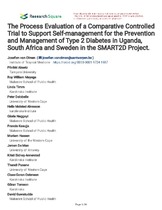The process evaluation of a comparative controlled trial to support self-management for the prevention and management of type 2 diabetes in Uganda, South Africa and Sweden in the smart2d project.
Date
2021-06Author
Hassen, Mariam
Absetz, Pilvikki
Mayega, Roy William
Metadata
Show full item recordAbstract
Background. Type 2 diabetes (T2D) and its complications are increasing rapidly. Support for healthy lifestyle and self-management is paramount, but not adequately implemented in health systems in most countries. Process evaluations facilitate understanding why and how interventions work through analysing the interaction between intervention theory, implementation and context. The SMART2D project implemented and evaluated community-based support interventions for persons at high risk of or having T2D in a rural community in Uganda, an urban township in South Africa, and socio-economically disadvantaged urban communities in Sweden. This study presents comprehensive analyses of the implementation process and interaction with context.
Methods. This paper reports implementation process outcomes across the three sites, guided by the MRC framework for complex intervention process evaluations and focusing on the three community strategies (peer support program; care companion; and link between facility care and community support). Data were collected through observations of peer support group meetings using a structured guide, and semi-structured interviews with project managers, implementers and participants.
Results. The countries focused their in-depth implementation in accordance with the feasibility and relevance in the context. In Uganda and Sweden, the implementation focused on the peer support intervention whereas in South Africa, it centred around the CC part. The community-facility link received the least attention in the implementation. Continuous capacity building received a lot of attention, but intervention reach, dose delivered and fidelity varied substantially. Intervention- and context-related barriers affected participation. The analysis revealed how context shaped the possibilities of implementation, the delivery and participation and affected the mechanism of impact.
Conclusions. Identification of the key uncertainties and conditions facilitates focus and efficient use of resources in process evaluations, and context relevant findings. The use of an overarching framework allows to collect cross-contextual evidence and a flexibility in evaluation design to adapt to the complex nature of the intervention. When designing an intervention, it is crucial to consider aspects of the implementing organization or structure, absorptive capacity, and to thoroughly assess and discuss implementation feasibility, capacity and organizational context with the implementation team and recipients. These recommendations are important for implementation and scale up

